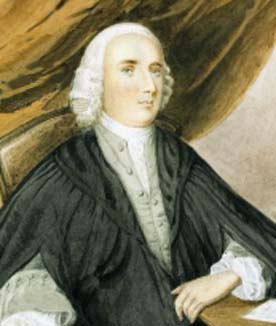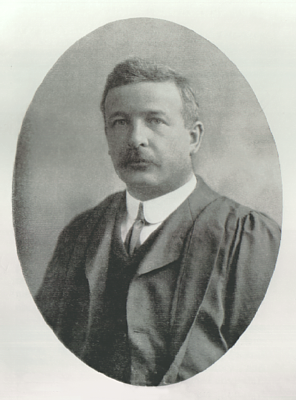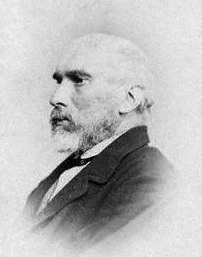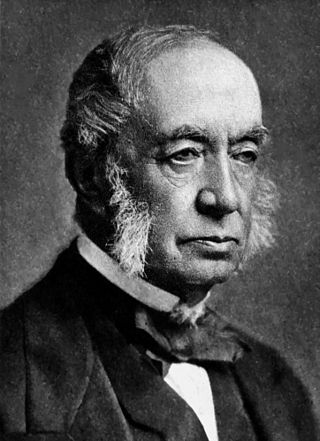
David Mather Masson LLD DLitt, was a Scottish academic, supporter of women's suffrage, literary critic and historian.

Jordanhill Campus is an historic 30.9-acre (12.5-hectare) estate within the boundaries of Jordanhill, Glasgow, Scotland, which developed as a country estate. It is best known and most recently used as the home to the Faculty of Education of the University of Strathclyde. Empty since 2012, after all previous educational activities were moved to the John Anderson Campus, the site which includes the Grade B listed David Stow building, is now up for sale with "minded to approve" planning permission for up to 364 new homes across 12 plots.
The Linnean Society of London is a learned society dedicated to the study and dissemination of information concerning natural history, evolution, and taxonomy. It possesses several important biological specimen, manuscript and literature collections, and publishes academic journals and books on plant and animal biology. The society also awards a number of prestigious medals and prizes.

Matthew Stewart FRS FRSE (1717–1785) was a Scottish mathematician and minister of the Church of Scotland.

William John Watson FRSE LLD was a toponymist, one of the greatest Scottish scholars of the 20th century, and was the first scholar to place the study of Scottish place names on a firm linguistic basis.

Sir William Stirling-Maxwell, 9th Baronet, KT, FRSE was a Scottish historical writer, art historian and politician.

Rt Hon John Inglis, Lord Glencorse FRSE DCL LLD was a Scottish politician and judge. He was Lord President of the Court of Session (1867–1891).
James Moncreiff, 1st Baron Moncreiff of Tullibole LLD was a Scottish lawyer and politician.

Glasgow University Library in Scotland is one of the oldest and largest university libraries in Europe. At the turn of the 21st century, the main library building itself held 1,347,000 catalogued print books, and 53,300 journals. In total, the university library system including branch libraries now holds approximately 2.5 million books and journals, along with access to 1,853,000 e-books, and over 50,000 e-journals. The University also holds extensive archival material in a separate building. This includes the Scottish Business Archive, which alone amounts to 6.2 kilometers of manuscripts.

Archibald Smith of Jordanhill was a Scots-born barrister and amateur mathematician.
William Henry Lang FRS FRSE FLS was a British botanist and served as Barker professor of cryptogamic botany at the University of Manchester. He was also a specialist in paleobotany.

Allen Thomson FRS FRSE FRCSE was a Scottish physician, known as an anatomist and embryologist.
James Yates F.R.S., F.L.S., F.G.S. was an English Unitarian minister and scholar, known as an antiquary.

James Smith of Jordanhill FRSE FRS MWS (1782–1867) was a Scottish merchant, antiquarian, architect, geologist, biblical critic and man of letters. An authority on ancient shipbuilding and navigation, his works included "Newer Pliocene" (1862) and "Voyage and Shipwreck of St Paul" (1848).
John FergusonFRSE LLD was a Scottish chemist and bibliographer. He is noted for the early alchemy and chemistry bibliography Bibliotheca chemica. He was generally nicknamed Soda Ferguson. The Ferguson Collection, a collection of 7,500 books and manuscripts from his personal library is held by the University of Glasgow.
Thomas Brown of Lanfine and Waterhaughs FRSE FFPSG was a noted Scottish surgeon with an interest in botany, mineralogy and fossil collecting. He is best remembered for his large donation of his entire lifetime collection of fossils etc. to the University of Glasgow, which is generally known as the Lanfine Collection.

The Geological Society of Glasgow is a scientific society devoted to the study of geology in Scotland.

George Oswald of Scotstoun (1735–1819) was a Scottish merchant of Glasgow. In 1797 he was elected Rector of the University of Glasgow.
William Smith of Carbeth Guthrie (1787–1871) was a 19th-century Scottish sugar trader who served as Lord Provost of Glasgow from 1822 to 1824.

John Campbell was a Scottish surgeon. He served as president of the Royal College of Surgeons of Edinburgh from 1832 to 1834. In that capacity he was the last president of the College to sit ex officio as a member of the Edinburgh Town Council, so ending a tradition dating from 1583. During his presidency the College made the most significant change of location in its history, moving from Old Surgeons Hall in Surgeons' Square to the present Playfair building in Nicolson Street.












